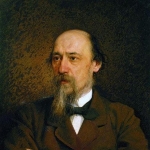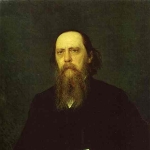Semyon Gertso-Winogradsky (Baron X) was a columnist, journalist, literary critic, theater critic, and feuilletonist.
Background
Semyon Gertso-Winogradsky was born on September 1, 1844, in Bender, Bessarabian province, Russian Empire (now the Republic of Moldova) into a noble family. His father was a district police officer. He was the brother of Petr Gertso-Winogradsky, a Russian journalist.
Education
In 1864 Semyon Gertso-Winogradsky graduated from the first Chisinau Gymnasium (Chisinau, Moldova). In the period from 1895 to 1869, he studied at the Law Faculty of Imperial Novorossiysk University (Odessa, Ukraine).
Career
In 1869 Semyon Gertso-Winogradsky published the first feuilleton - Not all that glitters is gold (Odessa newsletter). From 1872 he worked as a professional journalist: was an employee of the Odessa newsletter (until 1875), then the newspaper Novorossiysk Telegraph (1876-1878). In 1881 he collaborated with the Odessa Leaflet (1881-1888, 1894-1903), Odessa News (1889-1993), and in the satirical journal Pchela (1881-1882, 1884-1889).
In feuilleton-reviews of Odessa life, in literary and theatrical criticism, Semyon popularised Nikolay Mikhaylovsky and Alexander Skabichevsky. Semyon's journalistic and critical speeches remained on the pages of newspapers. Although his separate publication was the book Humor. poems, thoughts, jokes ... (Saint Petersburg, 1879), which was a collection of puns in the spirit of an entertaining "small press".
Politics
In the late 70s, Semyon Gertso-Winogradsky took to Odessa revolutionary circles. Participants used to gather at his apartment. In 1879 Semyon Gertso-Winogradsky was exiled to Krasnoyarsk (Russian Federation). After an attempted suicide in 1880 he was transferred to Samara, Russia ("for repentance").
Semyon Gertso-Winogradsky considered the "peasant issue" to be the "most fundamental one" of our time, but he did not admire the "national spirit". He divided the "cultural layer" into the "intellectuals" (devoted to the ideal) and the "bourgeoisie".
Views
Semyon Gertso-Winogradsky believed that art was intended to showcase the phenomena of reality for the purpose of aesthetic pleasure, to clarify and evaluate them from the standpoint of a moral ideal. In the early 80s, he began to consider the urge for self-improvement as one of the most important goals of art. In the late 80s - early 90s Semyon Gertso-Winogradsky recognized educational power only in things "exalted, majestic, heroic". Like Shakespeare, Schiller (especially "The Robbers"), Cornell, Racine, Hugo.
Personality
Semyon Gertso-Winogradsky was often described by his colleagues and column readers as a lively, witty, observant person with moral ideals. His personality made him amiable and popular.
Physical Characteristics:
Semyon Gertso-Winogradsky had thick brown hair, wore spectacles, and a moustache.
Quotes from others about the person
Ivan Belokonsky: "He had no equal in the province."
Vlas Doroshevich: "Semyon became the idol throughout the South."
"Odessa leaflet" typographers: "He is a sower of truth, kindness, and love on the literary field."




















